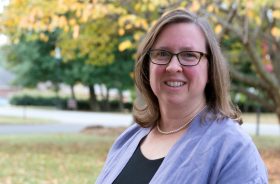"Solidarity Ethics: Transformation in a Globalized World" by Elon University's Rebecca Todd Peters explores the moral challenges of living in a global economy and imagines new ways of combating social injustices by building deeper relationships with those who suffer.
 If you want to better understand the problems of the world, it helps if you can see through the eyes of other people. Their backgrounds and perspectives may be completely different from your own, but that can often be a good thing, since it makes social woes less abstract and more personal to those who aren’t always paying attention to current events.
If you want to better understand the problems of the world, it helps if you can see through the eyes of other people. Their backgrounds and perspectives may be completely different from your own, but that can often be a good thing, since it makes social woes less abstract and more personal to those who aren’t always paying attention to current events.
How do you change your worldview? What makes it easier to empathize with other people of diverse backgrounds? And where in history should today’s Christians draw inspiration to critically examine the systems that foment social injustice?
Rebecca Todd Peters, a professor of religious studies and one of Elon University’s most accomplished scholars, offers answers to such questions in a new book that cites Christian traditions in a call to action against political and economic systems indifferent to the suffering they create.
“Solidarity Ethics: Transformation in a Globalized World” suggests a moral framework for readers living in industrialized nations where capitalism, despite its strengths, exploits people elsewhere on the planet who make the clothes and grow the foods that First World residents consume.
“I’m trying to invite people of faith, who are good people, into a conversation about the problems in the world we live in, and how do we step out of our cocoon to see our world differently, to make change?” Peters said.
That broader conversation involves business owners, policy experts, educators, faith leaders and others who want to address the structural roots of social woes like poverty, hunger and illiteracy. Peters cited homelessness as just one example. Why, she asks, does it even exist in the United States, which boasts the world’s largest economy and one of the highest standards of living?

Yet most people either accept such an economic system as unchangeable, or they don’t bother to examine its shortcomings at all, Peters said. “What does it mean that one lifestyle or culture is born on the backs of people we will never see, and never know, who are being exploited?” she said. “It becomes a moral question for all people.”
In her book, published this winter by Fortress Press, Peters also puts forward her definition of “solidarity,” a term used in various fashions by philosophers, Christian theologians and ethicists over the past few centuries. Solidarity requires four attributes: the transformation of mind or soul to recognize problems, honoring difference and recognition of privilege, accountability to other people and, perhaps most importantly, action.
“If your mind is changed and you’ve examined your privilege and you’re in a relationship with people, but you don’t do anything, it’s not solidarity,” she said. “Solidarity requires that you act.”
Peters began her career at Elon in 2001 as the Distinguished Emerging Scholar of Religious Studies. She would soon win the Trinity Prize for her first book, “In Search of the Good Life: The Ethics of Globalization,” which was lauded by renowned philosopher and critic Cornel West as “the best treatment of the complex debate on globalization by a religious ethicist now available.”
She has edited books on Christianity and social justice from a feminist perspective and published articles on sexuality and post-colonial issues. Peters also has served as chair of the Southeast Commission on the Study of Religion and as president of the American Academy of Religion, Southeast Region. She currently serves on the Standing Commission of the World Council of Churches’ Faith and Order Commission.
Peters’ accomplishments earned her Elon University’s Distinguished Scholar Award for the 2012-13 academic year. She today coordinates the university’s Poverty and Social Justice program and teaches courses in religious studies, poverty and social justice, environmental studies, and women and gender studies.


